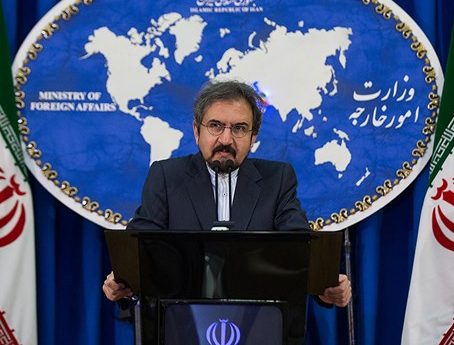Iran’s Foreign Ministry Spokesman Bahram Qassemi has, in a Farsi interview with IRNA, rejected the reports that suggest the European Union has imposed new sanctions on Iran.
He said those familiar with Europe’s complicated and multilayer bureaucracy know that the process of making policies and decisions within the Union is a long, time-consuming mechanism, and no decision is made spontaneously and immediately.
The spokesman added that decisions made at the EU are the result of a “major bureaucratic machine” and will be manifested in the form of a policy at the end of the day.
During the course of reaching consensus and making policies, the EU draws upon the opinions of various experts, managers, ministers and European heads of state, he noted.
“Different issues, namely policies and decisions in the foreign policy domain as well as economic issues, go through precise and specialized discussions by relevant experts and then by medium-ranking managers before they are put on the agenda at the meetings of relevant ministers (for example economy or foreign ministers),” Qassemi said.
“In the final stage, if approved by ministers, the issues will have to be ratified by European heads of state.”
Therefore, he noted, Iran rejects the allegations that the EU has given the thumbs up to new sanctions against the country.
These explanations indicate that the EU has not approved any new sanctions on Iran in recent months or even over the past three years, since the beginning of nuclear talks leading to the conclusion of the Joint Comprehensive Plan of Action, he added.
“So, the approval of so-called new EU sanctions as reported by some media outlets and newspapers is, in fact, the renewal of previous bans on certain individuals and organizations, which are reviewed and updated every few months.”
Therefore, he added, it will be inappropriate and imprecise to term the restrictions that the EU has recently approved, as new sanction.
Qassemi also denounced the ‘immoral and unprofessional’ move to link the EU’s sanctions renewal with the recent trips to Germany, France and Italy by Iranian Foreign Minister Mohammad Javad Zarif.
EU Committed to Iran Nuclear Deal
Elsewhere in his remarks, Qassemi reaffirmed that the EU has mostly lived up to its commitments under the JCPOA.
“The European Union, based on the Joint Comprehensive Plan of Action (JCPOA) and in accordance with the commitments of signatories to UN Security Council Resolution 2231, has, to a great extent, tried to live up to its commitments,” Qassemi said.
He at the same time referred to the breaches of promises by the US and the launching of untrue psychological warfare, saying unfortunately efforts have been made to hinder closer cooperation between major banking and financial institutions and Iran.
“Those who made such efforts are to blame, but these shortcomings and technical complexities which emerge in practice are of another kind,”
“Now, any talk of new sanctions is baseless and unreal,” he stressed.
Qassemi said Federica Mogherini, the EU foreign policy chief and the official in charge of monitoring the JCPOA implementation, President of the European Council Donald Tusk, President of the European Commission Jean-Claude Juncker and all major EU officials and European leaders have expressed their unflinching support for the JCPOA and stressed the deal should remain in place.
“In practice, Europeans have stood up to the United States’ acquisitiveness and unilateralism, keeping the new US administration from exerting hostile and malicious pressure on our country, especially when it comes to the JCPOA.”
He then referred to the meetings of the UN Security Council over the past few days, and added the European countries which are members of the UN Security Council voiced their all-out support for the JCPOA in those sessions despite propaganda campaigns and the political pressure by the US ambassador to the UN.
“This is another sign which shows the EU remains committed to the JCPOA,” said the spokesm
